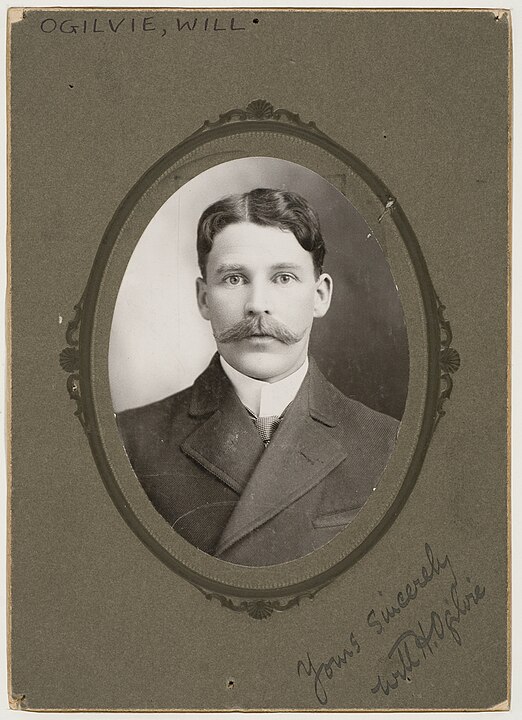If you enjoy Australian literature, you probably know about the Australian “bush poets,” Banjo Paterson, Henry Lawson, and “Glenrowan.” Glenrowan was one of the pen names of William Henry Ogilvie, who was born August 21, 1869 in Kelso, Scotland. Ogilvie, who also used the pen names Will Ogilvie, Swingle-bar, and WHO, wrote well over 1,100 poems, mostly about Australia and life there in the early 20th Century. He was probably the best known of the bush poets, and became known in Australia as “bush balladist of the Outback.”
Ogilvie was born on his parents’ farm, and had seven siblings. Unusually for the time, he was the only one who ever married. But before that, he sailed to Australia when he was 20, encouraged by his father, who thought it would be good for him. He worked on sheep stations as a jackaroo (sort of an apprentice rancher), and started writing his bush poetry right away. He earned a reputation for his writing, as well as for being an excellent horseman.
He stayed in Australia for eleven years, and returned to Scotland when he was 31 to become a journalist. His next adventure was in the US, four years later, when he became a professor of “agricultural journalism” at Iowa State College. He stayed until 1908 (about 4 years) and returned again to Scotland where he got married. He stayed in Scotland for the rest of his life, but had acquired such a reputation in Australia that he received birthday wishes every year from school children there.
There aren’t too many rules for bush poetry; it’s a variety of “outsider art” that’s matched in many countries. In the US the closest analog is “cowboy poetry,” which is still an active genre. Ogilvie was good at ignoring authorial norms — among other things, he used the same title for different poems (sometimes several of them), and wrote in a rhythmic, almost singsong meter that was quite out of style for the time. At least among establishment poets.
Ogilvie was a friend of Harry “Breaker” Morant, who later became the subject of a 1978 play and a 1980 movie. He wrote a number of poems about Morant, including Harry Morant:
Harry Morant was a friend I had
In the years long passed away,
A chivalrous, wild and reckless lad,
A knight born out of his day,
He loved a girl, and he loved a horse,
And he never let down a friend,
And reckless he was, but he rode his course
With courage up to the end,
“Breaker Morant” was the name he earned,
For no bucking horse could throw
This Englishman who had lived and learned
As much as the bushmen know.
“The Breaker” is sleeping in some far place
Where the Boer War heroes lie,
And we’ll meet no more in a steeplechase–
Harry Morant and I.
Ogilvie continued to write when he returned to Scotland, but his later work never achieved the recognition of his Australian poems. There are at least seven memorials to him in Australia, as well as a cairn in Scotland near the village of Ashkirk. You can read more about him in the 1993 book Breaker’s Mate: Will Ogilvie in Australia, and find his work in a long list of books by and about Ogilvie.

Will Ogilvie at about 20 years old
